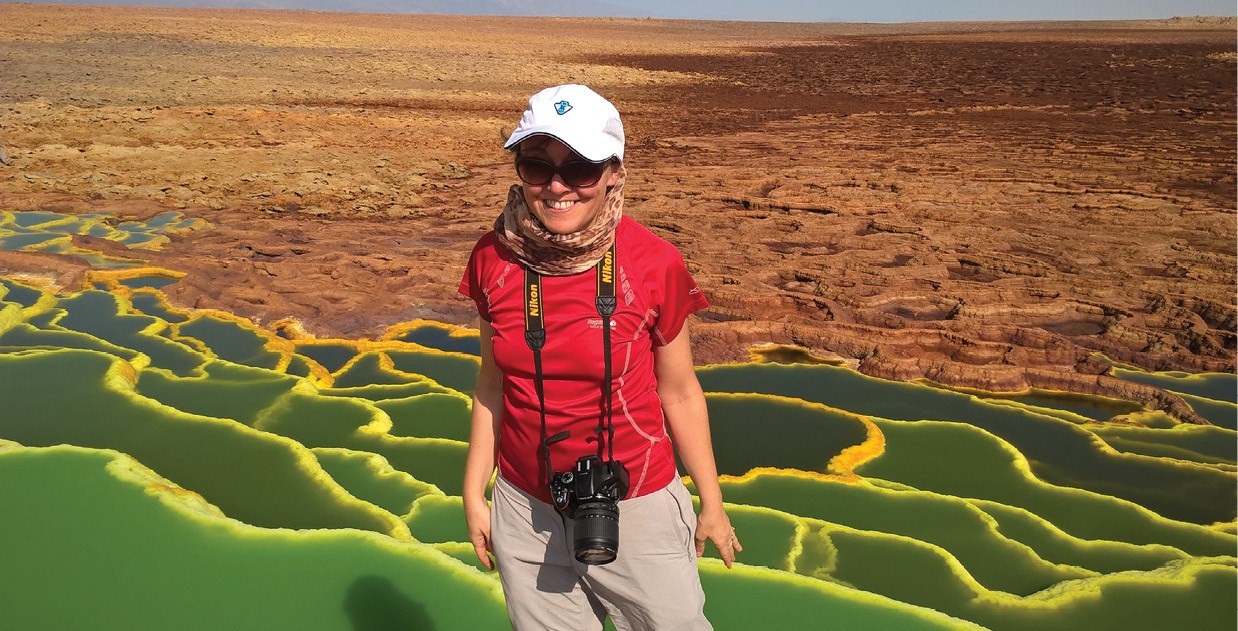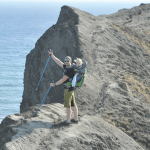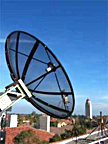Inspired by hard-working parents and an innate sense of compassion, GSA Head of Market Development Fiammetta Diani has traced a remarkable path to prominence in the world of satellite-based navigation.
Fiammetta Diani grew up in Legnano, in the north of Italy. Today, Legnano forms part of greater Milan, although it maintains a proud and distinct identity. “In medieval times, back in the 12th century, there was a famous battle fought in Legnano,” said Diani. “It was won by a federation of cities against the German Emperor. This marked the beginning of the long road to Italian independence.” A proud heritage, indeed.
By the 1980s, Legnano had become a prosperous industrial district. “When I was a child and teenager, there were many engineering and manufacturing companies in our area, leaders in their sectors. It was a nice place to live, with good schools, one hour’s drive to the mountains and not too far from the sea.
“However, to me it to was also the ‘deep province,’ from where, when you are growing up, you would like to escape.” Thus historic Legnano served as the departure point in Diani’s own journey towards independence.
She certainly had the support and encouragement of her parents. Her mother was always very kindhearted. “She takes care of people, and she worked very hard to take care of her children. She was always very active, and she still is today. I believe, I hope, that I inherited some of my mother’s energy and active spirit.”
Diani’s father was an entrepreneur in the food and leisure industry. “I inherited from him the entrepreneurial style that I apply every day in my work,” she said. “My father had a strong personality, was adventurous and always ready for new projects, while my mother was more careful, more conservative. The two sides balanced each other. My father inspired me to never give up and to look for the best in everything, every day.”
Both of Diani’s parents were born during World War II. “My mother’s family was separated and she only got to meet her father, my grandfather, when she was seven years old, after the end of the war. My parents’ families lived through some very difficult times.” Their childhood hardships behind them, Diani’s parents moved on with determination, eager to improve their lives. When they met in the early 1960s, their primary focus was on hard work—and each other. They raised two girls and a boy. “It was only later that they were able to do things for themselves, traveling and seeing something of the world,” Diani recalled.

Diani’s parents fostered a drive for excellence in their children. “They encouraged us to study hard but also to do sports,” she said. “I remember when my father decided to learn to ski. He was already 50 years old, but it was something he wanted to be able to do with his children. I have fantastic memories of being in the mountains with a large group of family and friends. There were so many of us that it was impossible not to lose somebody on the way! I learned early how to orientate myself and to read a map!”
With strong parental backing, she did extremely well in her schoolwork, and when it came time to choose a university, she made the then somewhat unorthodox decision to enroll at Milan Polytechnic as an aerospace engineering student. “My father was particularly proud to have a daughter taking engineering studies,” she said, “at the time still an exception for girls. And I think this feeling continued as I went on with my career.”
There were other reasons for the Dianis to be proud of their daughter. In 1998, just as she was achieving her engineering degree with a specialization in space systems, she was also busy doing volunteer work, founding a non-profit organization that offered a hand to underprivileged people in her area. Throughout her career, Diani has continued to demonstrate a compassionate nature, donating time to help those in need, most recently through activities with children and young people in Africa.
A new chapter was beginning. Diani was about to prove her commercial mettle.
A Profession Beckons
Diani first went to work as business development manager for aerospace firm Carlo Gavazzi Space in Milan, a job that eventually led her into the world of GNSS. “I started my career designing attitude and orbit control systems for small satellites,” she said.
“These systems keep them in the correct orbit, controlling position with respect to the Earth and the Sun so they can get enough solar energy and have their instruments and antennas correctly orientated. It was interesting work, but I soon discovered that I had a passion for business development, creating new products and services, understanding the needs of users and the dynamics of the market, and creating innovative solutions.”
In 2000, she helped spin off a new company from Carlo Gavazzi called Telematic Solutions. “The idea was to create everyday products using space technologies,” she said. “That meant Earth observation, telecommunications and of course GNSS. At the time, that was really only GPS.
“I set up a contract with an insurance company, to design one of the first telematic insurance products based on location. We had 10,000 users. The location-based elements were not as precise and reliable as today. I learned directly from the users—and from the customer-care statistics!—how important it is to have the high-quality GNSS we now enjoy.”
Diani put GNSS to one side as she honed her skills in product marketing, market analysis and strategy definition, and successfully introducing new products in several European countries. She rose to operating manager at Telematic Solutions and eventually made marketing and sales manager back at Carlo Gavazzi Space. She also embellished her CV with an MBA from the University of Ferrara.
Diani’s next move introduced her to the wider GNSS community.
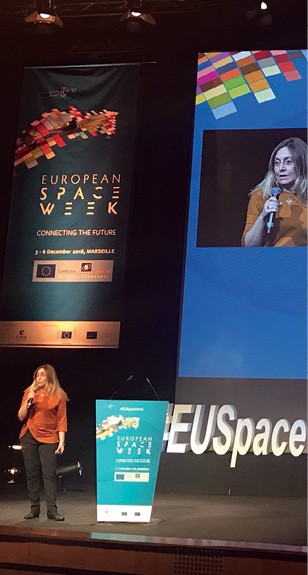
Welcome to the Show
“I think what led me back to GNSS for good was Galileo. While I did work with satellite positioning in the early years of my career, I then spent some years in what was really a completely different domain, creating information and communications products for retail business. But when Galileo started to take shape and become a program of the European Union, I knew where I wanted to be.”
In 2009, she joined the market
development arm of the European GNSS Agency (GSA), then located in Brussels. The GSA is the official EU agency in charge of exploitation, market development and security of European Global Navigation Satellite Systems, EGNOS and Galileo.
“I truly fell in love with GNSS when I joined the GSA,” she said. “The main challenge through my years at the Agency has been to convince the big worldwide players, such as chipset and receiver manufacturers and car makers, to invest in Galileo and include it in their products. We started when Galileo was still in its early deployment, but by 2019 we reached one billion enabled smartphones.”
Diani now leads GSA market development, having succeeded Gian-Gherardo Calini. One of her team’s main tasks is to support the development of innovative products and applications that leverage Galileo and EGNOS differentiators.
“Our main tool is the research and innovation budget delegated by the European Commission. We manage a portfolio of around 100 projects in several domains, involving hundreds of companies from all around Europe. Our role is to steer the projects from a technical perspective but also to help them develop their business.”
Many readers will be familiar with work carried out under the GSA’s funding scheme. Diani cited the ESCAPE project in particular (see Inside Unmanned Systems, Dec. 2019/Jan. 2020 issue, “Auto Safety, Integrity, Autonomy: Live Test Results Show Confidence.” Abridged version online at www.insidegnss.com/ESCAPE).
“They developed what we call a GNSS engine, leveraging especially European GNSS features, for autonomous cars at Level 4 of automation. The idea was to encourage investment in accurate and reliable GNSS that can serve this demanding application, using hybridization with other sensors but exploiting to the maximum what new GNSS, such as Galileo, can offer.”
Another area of particular interest to the GSA is the so-called Internet of things. “Power consumption is a big challenge here, because the ‘things’ can be around for years with no chance to recharge. And then there is the cost of the device. We have recently kicked off new projects, one based on a software receiver concept and the other on a low-power chip. Both propose to work out the position using a cloud computing approach. IoT is the new frontier for GNSS.
“GNSS is still the key technology for absolute positioning and will continue to be in the future, but it is not alone. The more demanding the application is, the more the integration with other sensors becomes essential. In recent years we have seen fusion of GNSS with computer vision techniques, especially for autonomous driving.
“From 2021,” Diani said, “the GSA will enlarge its scope and will receive new tasks from the European Commission. One of the main changes will be for my team to perform market and applications development for Copernicus, the European Earth observation system. Our new challenge will be to create synergies using the two systems together. We have already analyzed, together with the United Nations Office for Outer Space, several use cases and concluded that the combined use of the two systems can improve the contribution to sustainable development goals. We focused for example on emergency response, agriculture and mega-cities. We look forward to working more extensively on this new challenge.”
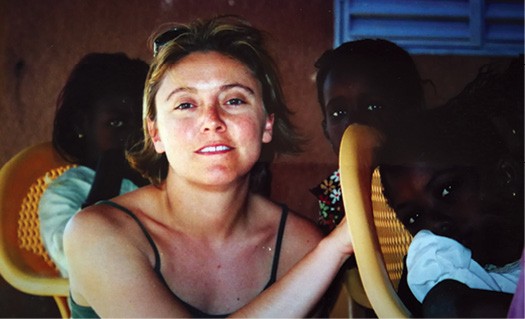
On Solid Ground
Fiammetta Diani has come a long way since her school days in Legnano. One of the things she is most proud of is her inclusion in the “Space Girls, Space Women” campaign, encouraging more girls to study and start a career in science and space-related fields (www.spacewomen.org/).
“I honor my roots, but I also look ahead,” she said. “Much has changed in my life. I am an engineer, I am the leader of a fantastic team at GSA, and I am a single parent.
“My son Francesco was a baby when we first left Italy for Brussels. It was not an easy move, because back home I could count on the support of my family, but once I moved away I knew I would be alone with my child. I think it was one of the best decisions of my life.”
When the GSA relocated from Brussels to Prague in 2012, it meant another big move for Diani and her young son, but by then they were used to it. And, after all, it wasn’t as if they were leaving Europe, now their proper home. “Europe for us is not just an abstract concept,” she said. “Francesco enjoys friends from different countries, who play together every day, who share common passions but also diversities. So not only do I have a job that I really love, but my son has had the great experience of growing up in an international environment.”
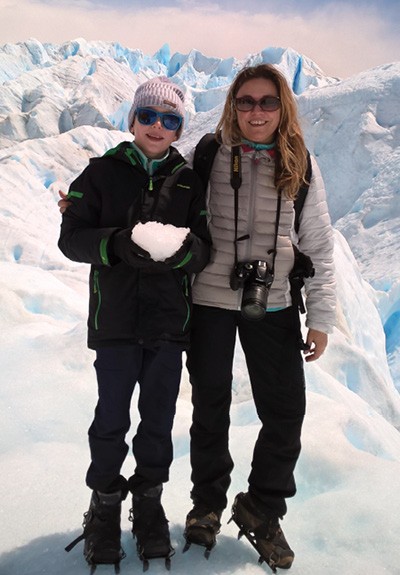
Francesco is now 12, a very athletic boy and a natural designer, Diani said. “But what I am most proud of is that he is good inside. He is very sensitive and generous. He understands other people and sympathizes with them.” Diani’s volunteer work continues, now with a little help from her boy.
“Recently, the two of us were in Africa,” she said, “working with a project for children’s education in Namibia, where, despite some economic progress, many people still live in very poor townships and children are trapped in a cycle of poverty. We presented some educational activities on space, including assembling a 3D model of the solar system, and building a small rocket to demonstrate some physical principles. It was a great success, for the local children and teachers, but also for Francesco, who got to play a lot of football with some new friends!”
Life, of course, cannot always be about rising. “My father was taken away from us without warning 10 years ago,” Diani said. “He died of a severe heart attack, and it hit me very hard, because I was not there when it happened.” But she believes his dynamic and adventurous spirit remains alive within her.
For the rest, life goes on. “My mum is still with us and we see each other regularly. Despite her age—she is 81—she still travels around and takes care of her grandchildren. She loves Prague and often comes to visit us. My brother is 10 years older than me, so when we were young we had quite different lives and friends, but we ‘met’ again as adults and we are now very linked. My sister and I grew up together and we have always been very close. In her I find the liveliness of my mum and the adventurous and positive attitude of my dad—so it’s not easy to have a relaxing time together!”
Then there are some things that she reserves only for herself, like having a go at film-making. “One of my big passions is the cinema,” she explained. “Recently, instead of the classical holiday, I decided to attend a film-making summer school. It was a fantastic experience, and along with the creative aspects such as screenwriting I was amazed at how much technology there is behind even the simple short movie I was shooting, from sound engineering to editing.”
What other unexpected marvels will we perceive as this GNSS dynamo continues her ascent? We watch and learn, inspired by the brilliant Fiametta Diani. Avanti, Fiammetta! Avanti e verso l’alto!

